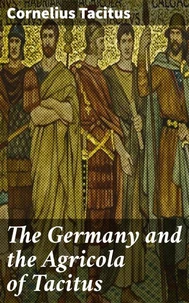Tacitus on Germany
Par : ,Formats :
Disponible dans votre compte client Decitre ou Furet du Nord dès validation de votre commande. Le format ePub est :
- Compatible avec une lecture sur My Vivlio (smartphone, tablette, ordinateur)
- Compatible avec une lecture sur liseuses Vivlio
- Pour les liseuses autres que Vivlio, vous devez utiliser le logiciel Adobe Digital Edition. Non compatible avec la lecture sur les liseuses Kindle, Remarkable et Sony
 , qui est-ce ?
, qui est-ce ?Notre partenaire de plateforme de lecture numérique où vous retrouverez l'ensemble de vos ebooks gratuitement
Pour en savoir plus sur nos ebooks, consultez notre aide en ligne ici
- Nombre de pages32
- FormatePub
- ISBN859-65--4701087-6
- EAN8596547010876
- Date de parution28/05/2022
- Protection num.Digital Watermarking
- Taille355 Ko
- Infos supplémentairesepub
- ÉditeurDIGICAT
Résumé
In "Tacitus on Germany, " the Roman historian Cornelius Tacitus presents a profound ethnographic study of the Germanic tribes inhabiting the regions beyond the Rhine. Combining a meticulous narrative style with keen political insight, Tacitus delineates the customs, societal structures, and moral values of various tribes, juxtaposing them against the corrupted Roman culture of his time. His keen observations reflect a literary style that blends historical narrative with philosophical musing, allowing readers to appreciate not only the sociopolitical implications of his observations but also the inherent nostalgia for a purer way of life.
Positioned within the context of Imperial Rome's expansionist endeavors, this work serves as both a record and a cautionary tale about cultural interaction and loss. Tacitus, born circa 56 AD, was a senator and a historian whose works remain crucial for understanding Roman history, society, and foreign cultures. His remarkable insight into human nature and governance likely stemmed from his experiences in the tumultuous political landscape of Rome.
Tacitus's personal engagement with the conflicts of his time, coupled with his rigorous intellectual rigor, shaped his perspective on the juxtaposition of civilization and barbarism, ultimately informing his depiction of the Germanic peoples. Highly recommended for both students and enthusiasts of ancient history, "Tacitus on Germany" invites readers to reflect on the complexities of cultural identity and the consequential nature of historical narratives.
This work not only enriches our understanding of the Germanic tribes but also encourages critical discourse on the implications of cultural imperialism, making it an essential addition to any scholarly library on Roman history.
Positioned within the context of Imperial Rome's expansionist endeavors, this work serves as both a record and a cautionary tale about cultural interaction and loss. Tacitus, born circa 56 AD, was a senator and a historian whose works remain crucial for understanding Roman history, society, and foreign cultures. His remarkable insight into human nature and governance likely stemmed from his experiences in the tumultuous political landscape of Rome.
Tacitus's personal engagement with the conflicts of his time, coupled with his rigorous intellectual rigor, shaped his perspective on the juxtaposition of civilization and barbarism, ultimately informing his depiction of the Germanic peoples. Highly recommended for both students and enthusiasts of ancient history, "Tacitus on Germany" invites readers to reflect on the complexities of cultural identity and the consequential nature of historical narratives.
This work not only enriches our understanding of the Germanic tribes but also encourages critical discourse on the implications of cultural imperialism, making it an essential addition to any scholarly library on Roman history.
In "Tacitus on Germany, " the Roman historian Cornelius Tacitus presents a profound ethnographic study of the Germanic tribes inhabiting the regions beyond the Rhine. Combining a meticulous narrative style with keen political insight, Tacitus delineates the customs, societal structures, and moral values of various tribes, juxtaposing them against the corrupted Roman culture of his time. His keen observations reflect a literary style that blends historical narrative with philosophical musing, allowing readers to appreciate not only the sociopolitical implications of his observations but also the inherent nostalgia for a purer way of life.
Positioned within the context of Imperial Rome's expansionist endeavors, this work serves as both a record and a cautionary tale about cultural interaction and loss. Tacitus, born circa 56 AD, was a senator and a historian whose works remain crucial for understanding Roman history, society, and foreign cultures. His remarkable insight into human nature and governance likely stemmed from his experiences in the tumultuous political landscape of Rome.
Tacitus's personal engagement with the conflicts of his time, coupled with his rigorous intellectual rigor, shaped his perspective on the juxtaposition of civilization and barbarism, ultimately informing his depiction of the Germanic peoples. Highly recommended for both students and enthusiasts of ancient history, "Tacitus on Germany" invites readers to reflect on the complexities of cultural identity and the consequential nature of historical narratives.
This work not only enriches our understanding of the Germanic tribes but also encourages critical discourse on the implications of cultural imperialism, making it an essential addition to any scholarly library on Roman history.
Positioned within the context of Imperial Rome's expansionist endeavors, this work serves as both a record and a cautionary tale about cultural interaction and loss. Tacitus, born circa 56 AD, was a senator and a historian whose works remain crucial for understanding Roman history, society, and foreign cultures. His remarkable insight into human nature and governance likely stemmed from his experiences in the tumultuous political landscape of Rome.
Tacitus's personal engagement with the conflicts of his time, coupled with his rigorous intellectual rigor, shaped his perspective on the juxtaposition of civilization and barbarism, ultimately informing his depiction of the Germanic peoples. Highly recommended for both students and enthusiasts of ancient history, "Tacitus on Germany" invites readers to reflect on the complexities of cultural identity and the consequential nature of historical narratives.
This work not only enriches our understanding of the Germanic tribes but also encourages critical discourse on the implications of cultural imperialism, making it an essential addition to any scholarly library on Roman history.







